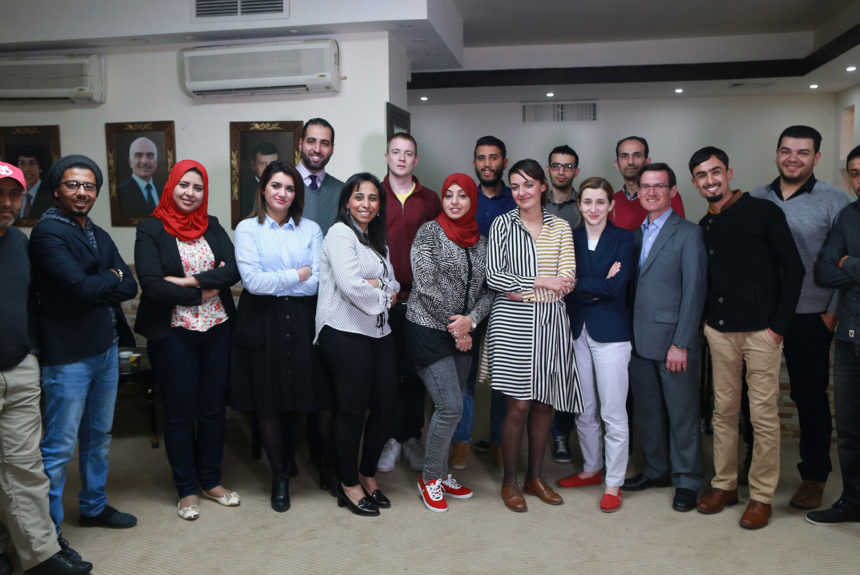The Libya Institute for Advanced Studies (LIAS) and the Rory Peck Trust jointly organized a 6-day intensive workshop for freelance journalists from throughout Libya. This was the second workshop LIAS and Rory Peck organized for freelance Libyan journalists in less than a year. The workshop was funded by the UNDEF and aimed to provide a core group of 15 Libyan freelance reporters and photojournalists with guidelines and training in safety and professional skills. The participants engaged in an intensive training schedule of workshops, between 28th of March and 2nd of April in Amman, Jordan.

DAY1
The first training session was led by the award winning journalist Rima Marouch, who delivered an orientation on the standards of an independent press corps and how freelance journalism functions as a form of media free of influence by government or corporate interests. The participants shared stories and experiences working as freelance journalists in Libya and Rima commented on each one’s experience with advice and guidance. Rim followed this first session with a workshop on “how to make a good pitch”, in which she shared essential pitching techniques with the participants, such as: “When pitching to editors, never send emails with no subject lines; no one opens them”. The participants were given an exercise to write a succinct and thorough pitch email for one of the stories that was shared in the session.
The first day of training also featured Ahmed Sennusi, a TV presenter at Libya Business Channel and Ibrahim Shebani, the General Manager of Libya Channel. Mr. Shebani gave feedback and professional advice on the stories that the participants shared during the session.

Day 2
On the second day, Rima and Paul Eedle, a filmmaker and journalist, led a workshop to guide participants on how to reach out to big media and broadcast clients, and how to search and provide them with the type of news they look for. The training was followed with an exercise for the participants to find 3 media outlets for their stories and identify how to contact them. Next, Paul led a discussion to talk about the differences between a journalist and an activist. Paul’s discussion was followed by stories from two independent accredited journalists:
Nabih Bulos, a special Middle East correspondent writing for Los Angeles Times, New York Times, The Telegraph, and NPR, talked about his life as a freelance journalist.
Ivor Prickett, a documentary photographer based in Istanbul, spoke about how he prioritizes and organize his time and efforts between covering his work projects and personal feature projects. He also shared his experience working for more than 2 years in the Middle East, documenting revolutionaries in Egypt and Libya during the Arab Spring in 2011

Day 3
On Day 3 Paul introduced participants to the basic knowledge of how to budget and schedule pitched stories. He stressed the importance of learning and implementing techniques to estimate the costs and the time a story takes from outset to submission. Following his introductory session, Paul asked participants to cost stories they pitched, using the estimating techniques they learned during the previous session. The participants were then teamed up for an exercise to use each other’s skills to make a stronger pitch.
In the next session Paul led a workshop on the code of ethics for journalists, coaching participants on how to report ethically in a polarized environment. “Everything in Journalism relies on trust,” he said.

After the break, Rana Sabbagh, a Jordanian journalist, columnist and media trainer joined the workshop. She is also the director of ARIJ (Arab Reporters for Investigative Journalism). Rana shared key insights and examples showing why and how a code of ethics for journalists is essential to maintain throughout a professional career.
Day 4
Rima led the first session of the day with a course on the primary skills that every freelance journalist should have: “In order to close the deal, the journalist should be able to allocate the right budget, identify the right audience, and reach out for the necessary insurance and back-up.” Participants were given an exercise to estimate the right budget for stories they have pitched. Following, she led a discussion on ways to deal with clients and how to handle difficult scenarios. Guest speaker, Sara Elizabeth Williams, a Canadian freelance journalist who works with Sunday Times, took the floor and shared safety tips on working as a woman freelance journalist. Rima concluded the day with a session on the best ways to deal with news from social media channels.

Days 5 & 6
Abeer Saady, an award-winning Egyptian freelance journalist. She is a consultant and training specialist, who has worked in a wide range of media across the Arab world for nearly quarter of a century. Abeer led a session on safety awareness, including a discussion with participants on the standards and principles that help ensure the safety freelance journalists’ in the field. Throughout the remaining two days of the workshop, Abeer coached participants on new skills to assess risk and stay safe in dangerous environments. “You are in danger when no one at all knows where you are.” Abeer said during the workshop.
Libyan journalists as well as videographers travel into conflict zones and remote areas to cover crucial stories on criminal offenses, human rights abuses and highly charged political issues. Abeer provided participants with fundamental travel safety tips to use when covering stories in dangerous areas.
On the final day of the workshop, Abeer discussed digital safety and online profile management. Social media communications are inherently insecure and can expose journalists working in sensitive environments and pose a threat to their lives. “As journalists, you must be precautious when using methods of online communication and social media channels to communicate sensitive topics in your stories.”
The 6-day workshop concluded with feedback from participants and trainers. Certificates of attendance were issued to each trainee.



